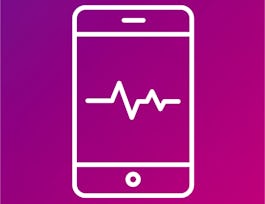This third of five courses explores topics related to the social determinants of health and health care systems. This course will also focus on the relationship between the social determinants of health, mental health, substance abuse, and trauma. The topics of this course include:



Social Determinants of Health: Health Care Systems
This course is part of Social Determinants of Health: Data to Action Specialization


Instructors: Daniel J. Pesut, Ph.D., RN, FAAN
Sponsored by InternMart, Inc
Details to know

Add to your LinkedIn profile
8 assignments
See how employees at top companies are mastering in-demand skills

Build your subject-matter expertise
- Learn new concepts from industry experts
- Gain a foundational understanding of a subject or tool
- Develop job-relevant skills with hands-on projects
- Earn a shareable career certificate


Earn a career certificate
Add this credential to your LinkedIn profile, resume, or CV
Share it on social media and in your performance review

There are 5 modules in this course
This module will introduce the concept of health literacy, as we also examine how health literacy is measured. In lesson one, we will look at some of the social determinants of health that interact with health literacy, as we investigate the link between low health literacy and poor health outcomes. We will also review the Health Literacy Umbrella as a framework for improving health literacy, as we evaluate several policies, solutions, and perspectives for addressing disparities in health literacy. In lesson two, we will explore some of the resources available for measuring health literacy as we consider the many perspectives of health literacy measurement.
What's included
3 videos5 readings2 assignments1 discussion prompt5 plugins
In this module, we will examine the impact of the social determinants of health on mental health and substance abuse. In lesson one, we will define mental health, as we look at the global prevalence and global burden of mental health disorders. This lesson will also focus on the global prevalence and global burden of substance abuse disorders, as we investigate influencing factors of drug use. Lesson two will introduce the life course approach to mental health, as we discuss both risk factors and protective factors that impact mental health. We will also consider how the social determinants of health contribute to mental health outcomes. Finally in lesson three, we will evaluate global, national, and regional policies and interventions for improving mental health outcomes.
What's included
4 videos10 readings2 assignments1 discussion prompt3 plugins
In this module, we will look at the relationship between violence, conflict and trauma and the social determinants of health. In lesson one, we will define the different types of trauma, as we look at the global prevalence of violent and traumatic events. We will also focus on the effects of trauma and violence in vulnerable populations. Lesson two will explore Adverse Childhood Experiences in the context of social determinants of health. The impact of trauma on vulnerable countries and communities will also be examined. In lesson three, we will evaluate community resources, policies and interventions for addressing violence, conflict, and trauma in communities. We will also look at examples of effective interventions as we consider how to improve the social determinants of health and reduce trauma experiences.
What's included
3 videos9 readings2 assignments1 discussion prompt1 plugin
This module will focus on the ethical considerations of addressing social determinants of health in health systems, and the ethical considerations of using SDOH-related data. In lesson one, we will explore the “Spheres of Influence'' framework in order to understand the ethical principles that guide how clinicians, health care organizations and communities should address SDOH. We will also examine the Public Health Code of Ethics, as we review the concept of health justice and health equity. In lesson two, we will evaluate the ethical considerations related to the use of SDOH data. We will also explore the five guiding principles proposed by the Executives for Health Innovation as part of the ethical framework for SDOH data. Finally, we will assess how the ethical frameworks discussed in this course can be applied to our course data sets, as we consider how our findings might be employed in a health system or to guide action to improve health.
What's included
2 videos4 readings2 assignments1 discussion prompt4 plugins
This module will focus on analyzing, displaying and interpreting social determinants of health data, with a particular focus on identifying correlations between social determinants of health. Lesson one will provide an overview of correlation analysis and heat map visualization. In lesson two, we will learn how to calculate the Pearson correlation coefficient and create heatmaps in R. Using the NHANES dataset, we will look at the correlation between income, education, marital status, family savings, depression, insurance, household size, drinks per day, smoker, and body mass index. Using the Omaha System dataset, we will look at the correlation between the social determinants of health signs & symptoms. Finally, we will discuss how to interpret the results of our analysis as we visualize our findings using heatmaps.
What's included
2 videos4 readings1 peer review1 discussion prompt1 ungraded lab4 plugins
Instructors


Offered by
Why people choose Coursera for their career




Recommended if you're interested in Health

Imperial College London

Imperial College London

Johns Hopkins University

Open new doors with Coursera Plus
Unlimited access to 10,000+ world-class courses, hands-on projects, and job-ready certificate programs - all included in your subscription
Advance your career with an online degree
Earn a degree from world-class universities - 100% online
Join over 3,400 global companies that choose Coursera for Business
Upskill your employees to excel in the digital economy



